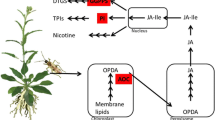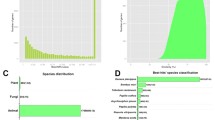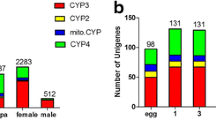Abstract
All eukaryotes use sterols as structural components in cell membranes and as precursors for key hormones. However, arthropods are unique among eukaryotes because they cannot synthesize sterols de novo and must acquire sterols through diet. Cholesterol is the dominant sterol in most insects; however, because plants contain little cholesterol, most insect herbivores convert phytosterols to cholesterol. An additional challenge for plant-feeding insects is that only limited types of phytosterols can be converted to cholesterol. In this study, we used RNA interference to modify the plant sterol profile to generate phytosterols that would negatively impact insect herbivores. Specifically, we knocked down the expression of Arabidopsis thaliana Δ8–Δ7-sterol isomerase gene (HYD1), responsible for the conversion of Δ8-sterols into Δ7-sterols. Silenced lines with > 95% transcript reduction showed drastically reduced sterol production and approximately half of the total sterols had a Δ8-configuration. Importantly, these sterol-modified lines exhibited normal growth compared to controls. In contract, the diamondback moth (Plutella xylostella) larvae reared on sterol-modified plants showed reduced growth and survival, while adults showed significantly decreased egg production. Sterol analysis of P. xylostella adults suggests these negative effects were likely a result of reduced cholesterol and the accumulation of Δ8-sterols. Finally, we modeled the effects of sterol-modified plants at the population level using our growth and reproductive data. We observed reduced population size and extended generation time after only two generations. Collectively, our results suggest that modifying plant sterols has potential for management of pest caterpillars, including the globally distributed P. xylostella.







Similar content being viewed by others
Availability of data and materials
The datasets and materials used in this study are available upon reasonable request from the corresponding authors.
References
Banazeer A, Afzal MBS, Hassan S, Ijaz M, Shad SA, Serrão JE (2022) Status of insecticide resistance in Plutella xylostella (Linnaeus) (Lepidoptera: Plutellidae) from 1997 to 2019: cross-resistance, genetics, biological costs, underlying mechanisms, and implications for management. Phytoparasitica 50:465–485. https://doi.org/10.1007/s12600-021-00959-z
Behmer S, Grebenok R (1998) Impact of dietary sterols on life-history traits of a caterpillar. Physiol Entomol 23:165–175. https://doi.org/10.1046/j.1365-3032.1998.232074.x
Behmer ST (2017) Overturning dogma: tolerance of insects to mixed-sterol diets is not universal. Curr Opinion Insect Sci 23:89–95. https://doi.org/10.1016/j.cois.2017.08.001
Behmer ST, Elias DO (1999) The nutritional significance of sterol metabolic constraints in the generalist grasshopper Schistocerca americana. J Insect Physiol 45:339–348. https://doi.org/10.1016/S0022-1910(98)00131-0
Behmer ST, Nes DW (2003) Insect sterol nutrition and physiology: a global overview. 31:1–72. https://doi.org/10.1016/s0065-2806(03)31001-x
Benveniste P (2004) Biosynthesis and accumulation of sterols. Annu Rev Plant Biol 55:429–457. https://doi.org/10.1146/annurev.arplant.55.031903.141616
Bloch K (1991) Chapter 12 Cholesterol: evolution of structure and function, vol. 20: new comprehensive biochemistry (ed. by DE Vance & JE Vance) Elsevier, pp 363–381. https://doi.org/10.1016/S0167-7306(08)60340-3
Bravo A, Gill SS, Soberón M (2007) Mode of action of Bacillus thuringiensis Cry and Cyt toxins and their potential for insect control. Toxicon 49:423–435. https://doi.org/10.1016/j.toxicon.2006.11.022
Chen IW, Grebenok RJ, Schaller H, Zhu-Salzman K, Behmer ST (2020) Aphid growth and reproduction on plants with altered sterol profiles: novel insights using Arabidopsis mutant and overexpression lines. J Insect Physio 123:104054. https://doi.org/10.1016/j.jinsphys.2020.104054
Ciufo LF, Murray PA, Thompson A, Rigden DJ, Rees HH (2011) Characterisation of a desmosterol reductase involved in phytosterol dealkylation in the silkworm, Bombyx mori. PLoS ONE 6:e21316–e21316. https://doi.org/10.1371/journal.pone.0021316
Corio-Costet MF, Charlet M, Benveniste P, Hoffman J (1989) Metabolism of dietary Δ8-sterols and 9β, 19-cyclopropyl sterols by Locusta migratoria. 11:47–62. https://doi.org/10.1002/arch.940110106
Crickmore N (2016) Bacillus thuringiensis resistance in Plutella: too many trees? Curr Opinion Insect Sci 15:84–88. https://doi.org/10.1016/j.cois.2016.04.007
Furlong MJ, Wright DJ, Dosdall LM (2013) Diamondback moth ecology and management: problems, progress, and prospects. Annu Rev Entomol 58:517–541. https://doi.org/10.1146/annurev-ento-120811-153605
Grieneisen ML (1994) Recent advances in our knowledge of ecdysteroid biosynthesis in insects and crustaceans. Insect Biochem Mol Biol 24:115–132. https://doi.org/10.1016/0965-1748(94)90078-7
Grouleff J, Irudayam SJ, Skeby KK & Schiøtt B (2015) The influence of cholesterol on membrane protein structure, function, and dynamics studied by molecular dynamics simulations. Biochim et Biophys Acta (BBA) - Biomembranes 1848:1783–1795. https://doi.org/10.1016/j.bbamem.2015.03.029
Guo Y, Liu C-X, Zhang L-S, Wang M-Q, Chen H-Y (2017) Sterol content in the artificial diet of Mythimna separata affects the metabolomics of Arma chinensis (Fallou) as determined by proton nuclear magnetic resonance spectroscopy. Arch Insect Biochem Physiol 96:e21426. https://doi.org/10.1002/arch.21426
Haines TH (2001) Do sterols reduce proton and sodium leaks through lipid bilayers? Prog Lipid Res 40:299–324. https://doi.org/10.1016/s0163-7827(01)00009-1
Hakim RS, Baldwin K, Smagghe G (2009) Regulation of midgut growth, development, and metamorphosis. Annu Rev Entomol 55:593–608. https://doi.org/10.1146/annurev-ento-112408-085450
Ikekawa N, Morisaki M, Fujimoto Y (1993) Sterol metabolism in insects: dealkylation of phytosterol to cholesterol. Acc Chem Res 26:139–146. https://doi.org/10.1021/ar00028a002
Jing X, Behmer ST (2020) Insect sterol nutrition: physiological mechanisms, ecology, and applications. Annu Rev Entomol 65:251–271. https://doi.org/10.1146/annurev-ento-011019-025017
Jing X, Grebenok RJ, Behmer ST (2012) Plant sterols and host plant suitability for generalist and specialist caterpillars. J Insect Physiol 58:235–244. https://doi.org/10.1016/j.jinsphys.2011.11.013
Jing X, Grebenok RJ, Behmer ST (2013) Sterol/steroid metabolism and absorption in a generalist and specialist caterpillar: effects of dietary sterol/steroid structure, mixture and ratio. Insect Biochem Mol Biol 43:580–587. https://doi.org/10.1016/j.ibmb.2013.03.012
Jing X, Grebenok RJ, Behmer ST (2014) Diet micronutrient balance matters: how the ratio of dietary sterols/steroids affects development, growth and reproduction in two lepidopteran insects. J Insect Physiol 67:85–96. https://doi.org/10.1016/j.jinsphys.2014.06.004
Koiwa H, Li F, McCully MG, Mendoza I, Koizumi N, Manabe Y, Nakagawa Y, Zhu J, Rus A, Pardo JM, Bressan RA, Hasegawa PM (2003) The STT3a subunit isoform of the Arabidopsis oligosaccharyltransferase controls adaptive responses to salt/osmotic stress. Plant Cell 15:2273–2284. https://doi.org/10.1105/tpc.013862
Kurzchalia TV, Ward S (2003) Why do worms need cholesterol? Nat Cell Biol 5:684. https://doi.org/10.1038/ncb0803-684
Lafont R, Dauphin-Villemant C, Warren JT & Rees H (2012) 4 - Ecdysteroid chemistry and biochemistry: insect endocrinology (ed. by LI Gilbert) Academic Press, San Diego, pp 106–176. https://doi.org/10.1016/B978-0-12-384749-2.10004-4
Lei J, Finlayson S, Salzman R, Shan L, Zhu-Salzman K (2014) BOTRYTIS-INDUCED KINASE1 modulates Arabidopsis resistance to green peach aphids via PHYTOALEXIN DEFICIENT4. Plant Physiol. https://doi.org/10.1104/pp.114.242206
Li S, Jing X (2020) Fates of dietary sterols in the insect alimentary canal. Curr Opinion Insect Sci 41:106–111. https://doi.org/10.1016/j.cois.2020.08.001
Livak KJ, Schmittgen TD (2001) Analysis of relative gene expression data using real-time quantitative PCR and the 2−ΔΔCT method. Methods 25:402–408. https://doi.org/10.1006/meth.2001.1262
Mohanpuria P, Kumar V, Ahuja PS, Yadav SK (2011) Agrobacterium-mediated silencing of caffeine synthesis through root transformation in Camellia sinensis L. Mol Biotechnol 48:235–243. https://doi.org/10.1007/s12033-010-9364-4
Nes WD, Lopez M, Zhou W, Guo D-a, Dowd PF, Norton RA (1997) Sterol utilization and metabolism by Heliothis zea. Lipids 32:1317–1323. https://doi.org/10.1007/s11745-006-0170-5
Piironen V, Toivo J, Puupponen-Pimiä R, Lampi A-M (2003) Plant sterols in vegetables, fruits and berries. J Sci Food Agric 83:330–337. https://doi.org/10.1002/jsfa.1316
Rahier A, Pierre S, Riveill G, Karst F (2008) Identification of essential amino acid residues in a sterol 8,7-isomerase from Zea mays reveals functional homology and diversity with the isomerases of animal and fungal origin. Biochem J 414(2):247–259. https://doi.org/10.1042/BJ20080292
Ritter KS (1983) Metabolism of Δ0-, Δ5-, and Δ7-Sterols by Larvae of Heliothis zea. Arch Insect Biochem Physiol 1:281–296. https://doi.org/10.1002/arch.940010310
Ritter KS (1986) Utilization of Δ5,7 - and Δ8-sterols by larvae of Heliothis zea. 3: 349–362. https://doi.org/10.1002/arch.940030404
Schaller H (2003) The role of sterols in plant growth and development. Prog Lipid Res 42:163–175. https://doi.org/10.1016/S0163-7827(02)00047-4
Schaller H (2004) New aspects of sterol biosynthesis in growth and development of higher plants. Plant Physiol Biochem 42:465–476. https://doi.org/10.1016/j.plaphy.2004.05.012
Schrick K, Fujioka S, Takatsuto S, Stierhof YD, Stransky H, Yoshida S, Jürgens G (2004) A link between sterol biosynthesis, the cell wall, and cellulose in Arabidopsis. Plant J. https://doi.org/10.1111/j.1365-313X.2004.02039.x
Silve S, Dupuy PH, Labit-Lebouteiller C, Kaghad M, Chalon P, Rahier A, Taton M, Lupker J, Shire D, Loison G (1996) Emopamil-binding protein, a mammalian protein that binds a series of structurally diverse neuroprotective agents, exhibits delta8-delta7 sterol isomerase activity in yeast J Biol Chem 271:22434–22440
Simons K, Ikonen E (1997) Functional rafts in cell membranes. Nature 387:569–572. https://doi.org/10.1038/42408
Simons K, Toomre D (2000) Lipid rafts and signal transduction. Nat Rev Mol Cell Biol 1:31–39. https://doi.org/10.1038/35036052
Suza WP, Chappell J (2016) Spatial and temporal regulation of sterol biosynthesis in Nicotiana benthamiana. Physiol Plant 157:120–134. https://doi.org/10.1111/ppl.12413
Suzuki M, Kamide Y, Nagata N, Seki H, Ohyama K, Kato H, Masuda K, Sato S, Kato T, Tabata S, Yoshida S, Muranaka T (2004) Loss of function of 3-hydroxy-3-methylglutaryl coenzyme A reductase 1 (HMG1) in Arabidopsis leads to dwarfing, early senescence and male sterility, and reduced sterol levels. Plant J 37:750–761. https://doi.org/10.1111/j.1365-313X.2004.02003.x
Tabashnik BE, Brévault T, Carrière Y (2013) Insect resistance to Bt crops: lessons from the first billion acres. Nat Biotechnol 31:510–521. https://doi.org/10.1038/nbt.2597
Topping JF, May VJ, Muskett PR, Lindsey K (1997) Mutations in the HYDRA1 gene of Arabidopsis perturb cell shape and disrupt embryonic and seedling morphogenesis. Development 124:4415–4424. https://doi.org/10.1242/dev.124.21.4415
Wang J, Megha, London E (2004) Relationship between sterol/steroid structure and participation in ordered lipid domains (lipid rafts): implications for lipid raft structure and function. Biochemistry 43:1010–1018. https://doi.org/10.1021/bi035696y
Zhang XR, Henriques R, Lin SS, Niu QW, Chua NH (2006) Agrobacterium-mediated transformation of Arabidopsis thaliana using the floral dip method. Nat Protoc 1:641–646. https://doi.org/10.1038/nprot.2006.97
Acknowledgements
We are grateful to Dr Hubert Schaller (Institut de Biologie Moléculaire des Plantes du CNRS) for valuable insights in plant sterol pathways and selection of T1 RNAi lines. This study was supported by the United States Department of Agriculture—the Agriculture and Food Research Initiative (USDA-AFRI, #2016-67013-24762 granted to STB, KZS and RJG), and by a Chinese Scholarship Council scholarship to IWC.
Funding
This study was funded by the United States Department of Agriculture—the Agriculture and Food Research Initiative (USDA-AFRI, #2016-67013-24762), and a Chinese Scholarship Council scholarship.
Author information
Authors and Affiliations
Corresponding authors
Ethics declarations
Competing interests
The authors declare no competing interests.
Ethical approval
This article does not contain any studies with human participants or regulated animals performed by any of the authors.
Additional information
Communicated by Antonio Biondi.
Publisher's Note
Springer Nature remains neutral with regard to jurisdictional claims in published maps and institutional affiliations.
Supplementary Information
Below is the link to the electronic supplementary material.
Rights and permissions
Springer Nature or its licensor (e.g. a society or other partner) holds exclusive rights to this article under a publishing agreement with the author(s) or other rightsholder(s); author self-archiving of the accepted manuscript version of this article is solely governed by the terms of such publishing agreement and applicable law.
About this article
Cite this article
Chen, I.W., Grebenok, R.J., Zhao, C. et al. RNAi-mediated plant sterol modification to control insect herbivore pests: insights from Arabidopsis and the diamondback moth. J Pest Sci 97, 725–737 (2024). https://doi.org/10.1007/s10340-023-01651-3
Received:
Revised:
Accepted:
Published:
Issue Date:
DOI: https://doi.org/10.1007/s10340-023-01651-3




